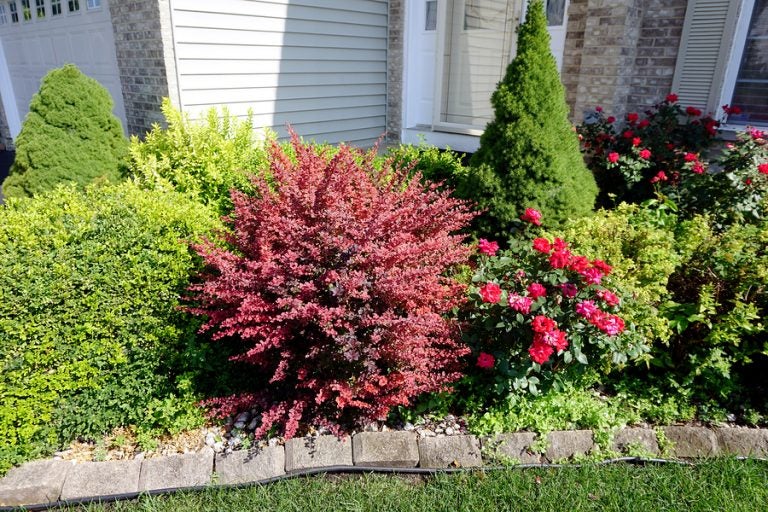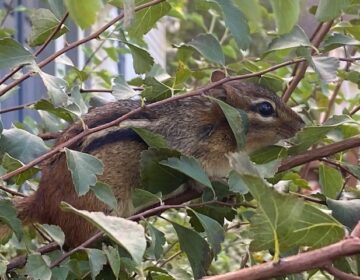Pa. considers banning Japanese barberry, a popular but invasive landscaping plant
The shrub is already banned in New York, Maine, and other states. It’s a haven for ticks and mice.

A red crimson Japanese barberry bush (Berberis thunbergii) grows in the middle of a decorative garden in front of a home (Bigstock/Willard Losinger)
Look at gardens or front yards across the Northeast U.S., and you’ve probably seen the Japanese barberry.
The small shrub — usually about 2 or 3 feet tall — has elegant arching branches, spoon-shaped leaves ranging from light yellow or green to dark red, and small red berries. It’s also very tough, and deer find it unpalatable.
Those are excellent qualities for a homeowner in search of something green, said Sarah Wurzbacher, a forester with Penn State Extension. But the attractive Japanese barberry is an invasive species that can grow unchecked by predators or diseases, taking space and sunlight away from native plants and trees.
On July 24, the Pennsylvania Department of Agriculture will host a public meeting to talk about whether Japanese barberry should be banned in the state. It’s already banned in New York, Maine, and Minnesota.
That’s partly because the plant could be bad for human health as well. It provides a haven for ticks that carry the bacteria responsible for Lyme disease.
And areas with a lot of Japanese barberry often have more of those ticks, according to research from the University of Connecticut.
“To a tick, a barberry is a skyscraper; it’s got this huge protective cover that provides this little microclimate on the forest floor,” Wurzbacher said.
Ticks prefer humid places, and a barberry provides a little humid shelter for them, she said. And it’s also hospitable for white-footed mice that carry the ticks.
“Barberry provides this thorny-structured, very dense cover for mice to thrive, with some protection from predators,” she said. “And they can kind of run around happily in these thickets of barberry.”
A ban might not go over well with everyone. When West Virginia recently proposed banning the shrub, the landscaping industry pushed back, said Crescent Gallagher, communications director for the West Virginia Department of Agriculture.
The landscaping industry in West Virginia had already started growing Japanese barberry stock and needed time to sell off what it had in reserve, so the state’s department of agriculture ultimately decided to implement the ban in 2020.
Because it is not illegal to transport the plant across state boundaries. Gallagher said he hopes bordering states will consider banning it as well.
Leah Blanton, project specialist for the public landscapes team at the Pennsylvania Horticultural Society, said she has removed Japanese barberry from quite a few gardens in Philadelphia — including the Azalea Garden in Fairmount Park and at Penn’s Landing.
Native plants that landscapers could use instead of Japanese barberry include the oak leaf hydrangea, red chokeberry, or winterberry, she suggested.
WHYY is your source for fact-based, in-depth journalism and information. As a nonprofit organization, we rely on financial support from readers like you. Please give today.





